Stay in the know on all smart updates of your favorite topics.
Oamsterdam designed by HofmanDujardin
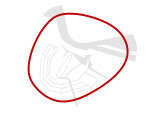
HofmanDujardin was founded in 1999 by architects Barbara Dujardin and Michiel Hofman. The international team of architects, interior and visual designers work on a variety of architecture, renovation and interior design projects. The design philosophy of HofmanDujardin is Shaping Intuition®, a personal approach that creates inspiring and clear designs of high quality. Natural, intuitive feelings are subtly embodied in architecture, in interiors and in products. At HofmanDujardin, building in harmony with the natural human need for balance is central. Both design and process are characterized by a personal approach, astounding clarity, understated quality and energetic inspiration. The firm is located in the ancient harbor district of Amsterdam.
HofmanDujardin was founded in 1999 by architects Barbara Dujardin and Michiel Hofman. The international team of architects, interior and visual designers work on a variety of architecture, renovation and interior design projects. The design philosophy of HofmanDujardin is Shaping Intuition®, a personal approach that creates inspiring and clear designs of high quality. Natural, intuitive feelings are subtly embodied in architecture, in interiors and in products. At HofmanDujardin, building in harmony with the natural human need for balance is central. Both design and process are characterized by a personal approach, astounding clarity, understated quality and energetic inspiration. The firm is located in the ancient harbor district of Amsterdam.
Co-Creating Responsive Urban Spaces

The rapid developments of smart sensoring kick-started a new industry. However, in relation to public space, sensors are mainly used in interactive objects as part of cultural or temporal exhibitions like the Amsterdam Light Festival and Glow in Eindhoven. The Co-ReUS project aims to bring these kind of objects into the challenges of spatial design of public space.
Do you have a question, are you interested to join and/or would you like to follow the project via Newsletters? Please send an mail to project manager Jolanda Tetteroo via j.i.a.tetteroo @ hva.nl (remove spaces)
Eerste Big Data Hub in Nederland.

De Amsterdam Arena vormt samen met het Big Data Value Center in Almere de eerste Big data Hub in Nederland. Een inspirerende omgeving om veilig te experimenteren met (big) data. Big Data en gemeenten; Jan van Ginkel gemeentesecretaris in Zaanstad verwoorde het prachtig.
‘Als je eenmaal door een databril naar de maatschappelijke vraagstukken hebt gekeken, dan kun je deze niet meer afzetten’
De Big Data Hub’s zijn opgezet om organisaties te laten ervaren wat je met Big Data kunt. De mogelijkheden nemen dagelijks toe. We kunnen het niet negeren en we kunnen het ons ook niet veroorloven om niets te doen. Wat we er precies met Big Data kunnen dat zijn we met elkaar aan het ontdekken. Het symposium op de 22e november Circulair en Data gedreven stadsbeheer is ook weer een goede stap op onze gezamenlijke Big Data ontdekkingstocht.
Smart Stadsbeheer Innovation Cafes
Werk samen aan slim stadsbeheer tijdens de Innovatie Cafés op dinsdag 22 november in Almere. De middag is gericht op directeuren Stadsbeheer in de MRA en hun talentvolle jonge ambtenaren, bedrijven en kennisinstellingen die werken aan slim stadsbeheer.
Organising Smart City Projects: Lessons learned from Amsterdam
The last two years, our partner the University of Applied Sciences systematically analysed 12 smart city projects in Amsterdam. In close cooperation with Amsterdam Smart City five researchers started a thorough evaluation of projects to draw lessons and make future smart city projects more effective.
The idea was to analyse the non-technological aspects of smart city projects
(partnerships, business models, scaling potential) since smart city solutions are not just about developing and applying technology. It demands new networking and management competencies. Solutions are not developed and implemented by one single company, but take shape in networks and with the involvement of citizens/end users. Partnerships are formed, they all work differently and face different challenges. In this study, a number of smart city projects in Amsterdam is analysed in their wider context.
This final report is now out and focuses on questions as:
- How do organisations with different agendas, collaborate on smart city projects?
- What challenges do they face?
- What kind of value is created?
- How are risks and returns shared, and how are users involved?
- What is the upscaling dynamic of smart city solutions, if any?
- How can smart city projects be managed professionally?
You can open the report below. This report is issued by the Amsterdam University of Applied Sciences and has been established in cooperation with Amsterdam Smart City.
On the 19th of December 2017 the insights of the report were shared at Pakhuis de Zwijger: https://amsterdamsmartcity.com/events/lessen-uit-een-slim-amsterdam
Are you interested in doing research together or do you have a smart city question? Get in touch via https://amsterdamsmartcity.com/projects/smart-entrepreneurial-lab.
Summary of the report here: https://drive.google.com/file/d/1ZexHe85DpGmpHjlPa9kam-TYUsUIR8Jp/view?usp=sharing
Residential Living Labs
Our company is establishing residential living labs for special user groups or mixed use on temporary or permanent locations. While testing, improving and applying innovation in circular construction, energy, IoT, social participation we improve urban livability and residential living. We cooperate with cities, universities, organisations and direct and indirect involved users/inhabitants.
If your city, university or organisation is interested to participate in this program, please contact info@woodyshousing.com, initiator of the International Residential Living Lab where data of different residentials living labs lead the way to the future of residential living and housing. If you like to become engaged on a personal level, please indicate your background and motivation.
Welke vlogger wint droomopdracht ‘Chasing the Sun’ en mag het dak op in Amsterdam?

Kun jij een beetje shinen?
De Amsterdamse Zoncoalitie is gestart met een unieke zoektocht naar Amsterdamse vloggers met een duurzaam hart. De winnaar wint een stralende opdracht, een groot zakelijk netwerk en een prachtige reis voor 2 personen naar de zon.
Heb jij wel wat met de zon, heb je een leuke kop en durf je mensen te interviewen? Zet jouw overtuigende promotiefilmpje over Amsterdam dan live op je eigen kanaal. Stuur ons de link (info@zoncoalitie.nl) en zorg dat jouw vrienden je aanprijzen.
PS Je mag je zonnebril ophouden ...
Heb je vragen? Bekijk de website www.zoncoalitie.nl, mail, of bel met Bernard Klaassen (06 10 24 83 85)
Kun jij een beetje shinen?
De Amsterdamse Zoncoalitie is gestart met een unieke zoektocht naar Amsterdamse vloggers met een duurzaam hart. De winnaar wint een stralende opdracht, een groot zakelijk netwerk en een prachtige reis voor 2 personen naar de zon.
Heb jij wel wat met de zon, heb je een leuke kop en durf je mensen te interviewen? Zet jouw overtuigende promotiefilmpje over Amsterdam dan live op je eigen kanaal. Stuur ons de link (info@zoncoalitie.nl) en zorg dat jouw vrienden je aanprijzen.
PS Je mag je zonnebril ophouden ...
Heb je vragen? Bekijk de website www.zoncoalitie.nl, mail, of bel met Bernard Klaassen (06 10 24 83 85)
Mobility: Sharing bicycles and more initiatives!
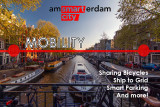
One of the urban challenges of cities (and for Amsterdam) is mobility. How to provide reliable and sustainable mobility/infrastructures for citizens, employees and tourists?
A recent solution has been announced last week: sharing bicycles. At ‘De Zuidas’ in Amsterdam, the Hello Bike will be introduced in 2017. You can reserve and unlock your bike via an app on your phone. The initiator, Hello Zuidas, hopes to reduce traffic jams around the Zuidas by the ‘Hello Bike’.
Are there more examples of smart projects and products related to smart mobility? Yes, we will give you an overview of some interesting posts and projects about mobility which have been shared on our community. Do you have an interesting project or product related to mobility? Share them!
E-mobility & City Logistics
Electrical vehicles do not emit greenhouse gases and other air pollutants like NO2. The project E-mobility & City Logistics supports public and private organisations in their ambition towards zero emission transport in 2025. The project E-mobility & City Logistics aims to contribute to large scale implementation of electric vehicles for freight transport and service logistics in urban areas.
Did you know that Amsterdam has set up many goals related to electrical vehicles? For instance, in 2025, all city buses will be emissions free!
Amsterdam Practical Trial
All cars, navigation systems, traffic lights and information signs connected with each other and automatically working? In this project, innovations and new technologies are tested in Amsterdam. Amsterdam Practical Trial contributes to improve traffic flow, less congestion and a cleaner city. Which lessons did we learn?
Ship to Grid
Using green renewable energy for ships in Amsterdam. 200 shore power stations allowing ships to connect to green energy instead of on board diesel generators for their power supply, in the program Ship to Grid. Better for the water and air quality! The shore power is available through connections that use a pay-by-telephone system. With a single telephone call, the captain will be able to activate a connection with the shore power station by entering his personal code. Smart!
WeParc
WeParc is a valet parking and car services company allowing consumers to book their parking in the city through our mobile app. How it works? Let one of our drivers pick up your car, park it into one of our secured lots and return it whenever, wherever. It’s easy, reliable and affordable.
Request: Participants for on-demand parcel pick up
Wuunder offers an on-demand pick-up within one hour in Amsterdam. With only a mobile phone and a pen you can ship your parcel. One (bike) courier collect the shipments and will do the hand-over to multiple carrier companies. This avoids multiple parcel delivery vans within the city. Interested? We're looking for people that enjoy giving feedback to make our service even better.
E-mail: Info@WeAreWuunder.com
Picture: Pixabay.com
Smart city pilots: scaling up or fading out?
We studied 12 smart city projects in Amsterdam, and –among other things- analysed their upscaling potential and dynamics. Here are some of our findings:
First, upscaling comes in various forms: rollout, expansion and replication. In roll-out, a technology or solution that was successfully tested and developed in the pilot project is commercialised/brought to the market (market roll-out), widely applied in an organisation (organisational roll-out), or rolled out across the city (city roll-out). Possibilities for rollout largely emerge from living-lab projects (such as Climate street and WeGo), where companies can test beta versions of new products/solutions. Expansion is the second type of upscaling. Here, the smart city pilot project is expanded by a) adding partners, b) extending the geographical area covered by the solution, or c) adding functionality. This type of upscaling applies to platform projects, for example smart cards for tourists, where the value of the solution grows with the number of participating organisations. Replication is the third and most problematic type of upscaling. Here, the solution that was developed in the pilot project is replicated elsewhere (another organisation, another part of the city, or another city). Replication can be done by the original pilot partnership but also by others, and the replication can be exact or by proxy. We found that the replication potential of projects is often limited because the project’s success is highly context-sensitive. Replication can also be complex because new contexts might often require the establishment of new partnerships. Possibilities for replication exist, though, at the level of working methods, specific technologies or tools, but variations among contexts should be taken into consideration.
Second, upscaling should be considered from the start of the pilot project and not solely at the end. Ask the following questions: What kind of upscaling is envisioned? What parts of the project will have potential for upscaling, and what partners do we need to scale up the project as desired?
Third, the scale-up stage is quite different from the pilot stage: it requires different people, competencies, organisational setups and funding mechanisms. Thus, pilot project must be well connected to the parent organisations, else it becomes a “sandbox” that will stay a sandbox.
Finally, “scaling” is not a holy grail. There is nothing wrong when pilot projects fail, as long as
the lessons are lessons learned for new projects, and shared with others. Cities should do more to facilitate learning between their smart city projects, to learn and innovate faster.
(With a team of five researchers of the Amsterdam University of Applied Sciences (AUAS/HvA) we systematically analysed several smart city projects in Amsterdam. This post includes one of the key insights into the management of smart city projects. The report with all our findings will be published next week on the online platform Amsterdam Smart City).
Postal Services and Smart Cities: five pilots, three business models and difficult questions to be answered
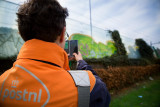
Last September, the office of inspector general of US post published a report on postal services and smart cities. In a recent podcast, the authors of the report sketch three business models and five pilots for postal operators. The pilots are on using the postal trucks to measure the quality of the road (e.g. pothole detection), bridges (measuring vibrations on the bridge), air quality (sensors on a car) measuring the quality of underground water infrastructure (using long range Bluetooth transmitters) and measuring urban blight (using the local presence of the carrier).
Last September, the office of inspector general of US post published a report on postal services and smart cities. In a recent podcast, the authors of the report sketch three business models and five pilots for postal operators. The pilots are on using the postal trucks to measure the quality of the road (e.g. pothole detection), bridges (measuring vibrations on the bridge), air quality (sensors on a car) measuring the quality of underground water infrastructure (using long range Bluetooth transmitters) and measuring urban blight (using the local presence of the carrier).
There are many opportunities for using the postal networks as data collection networks. Interestingly, I see many postal operators working on the same kind of propositions. Read my earlier blogs for more examples from Spain and Belgium.
Not only the pilots several postal carriers conduct are comparable but also the discussion on business models. The first business model is to rent inches in postal trucks where a customer can place sensors in. The second one is to define what data may be interesting (and to whom) and to actually collect this data. The final business model is a “full service provider” model.
Of course, the full service provider business model is the most interesting, but also the one with the highest risk. If I, as a postal operator, invest my money in turning the network into an air quality measurement platform, who will be paying for this collected data? Questions like this one are the barriers for growth within the smart city domain and not only for postal operators, but also for producers of smart lights, smart parking sensors or smart bins.
Another issue arising from the podcast is how to deal with privacy concerns? Take the urban blight detection pilot for example. In this pilot, the mailman can inform the municipality with early signals of urban blight. The benefit of the postal service is that they are present in every street. The carrier can see when a house becomes vacant e.g. when mail is not picked up. Being able to capture the knowledge of the carrier would be a huge opportunity. You can collect the same kind of information in different cities and compare it. The question is to what extent and for what reason mailmen are willing to share information they have and society is willing the mailman to share this data. If postal operators are the data collectors of the smart city of the future, this question must be addressed in more detail.
Therefore, I’m happy to attend the Smart Cities and the Internet of Things (IoT) summit organized by PostEurop on November 24. As I wrote in an earlier blog, it’s my strong conviction that there is a brigt future for postal organizations. However, their license to operate should come from local neighborhoods, inhabitants and customers and not from government officials. I think there are three main conditions postal operators should have in mind and which I will bring to the summit:
Condition 1: Postal services are part of local communities
Postal operators have to think about their place within the local ecosystem of every neighborhood: we are a part of those communities and not ‘just’ a supplier or ‘just’ a data collector. Most of the postal workers (at least in the Netherlands) live as a neighbor in the area wherein they deliver mail and collect data. In terms of business models, postal organizations should therefore be transparent about their activities, actively involve (opt in) or inform (opt out) consumers in their propositions and ask local communities about their opinions on the services provided.
Condition 2: Trust in the Mailman, his Abilities and in the Corporate he works for
Asking postal workers to execute extra activities may sound attractive in PowerPoint presentations for decision makers, but in practice we have to realize that this ‘logic’ is not automatically seen by others. For example, mailmen checking elderly people need to have the personal trust of the elderly people (“I know you and you are a nice person”), in his abilities (“you are indeed able to have a good conversation with me”) and in the corporate asking him to do the extra job (“this is a brand I trust”). This three levels of trust will give the postal operator the license to operate within the smart city domain, as a trusted, able and nice partner within the local community.
Condition 3: Business Models with Societal Benefits
To be sure not to be detached from the local community and to keep the three levels of trust high, postal organizations should focus on business models with societal benefits. Such as data collection from public spaces in order to keep cities clean, pothole detection, checking health conditions of elderly people. Not surprisingly, it are these kind of models postal operators worldwide are developing. Doing good by doing business should be the motto of postal organizations in the smart city domain. If they do, they will also be a good alternative of criticized “big brother is watching you” projects which we also find in the Smart City domain.
Are you retrofitting your building in an energy efficient way?
We love people who retrofit their homes and make them energy efficient. Those residential renovations can be supported via an EU subsidy.
But what about other buildings in our city? Do you know a school, community center, shop or office building that is being renovated to become very energy efficient? We would love to know those examples!
With this information we might be able to open up the subsidy to non residential buildings too! So leave a comment with your suggestions below.
Information meeting Virtual Power Plant
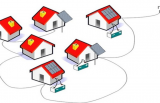
We are looking for 50 households in Amsterdam New-West with solar panels who like to participate in a sustainable project. Collectively you will sell energy on specific moments while buying energy on the energy markets at other times. By using the storage capacity of 50 batteries, buying energy can be done at the most favourable time.
The 50 participants will be able to use more sustainable energy and respond to the fluctuating prices. When there is a surplus of wind or solar energy, the batteries will be charged. When more energy is charged than the households are using, the batteries will be discharged. This will be done when the energy prices are high. A Virtual Power Plant will be created.
To participate you need to or want to have solar panels, a smart meter, internet access and enough space for the battery (141x50x38 cm). During the project your energy provider is Greenspread.
Are you interested?
-Join our information meeting in Molen van Sloten on Tuesday 8 November (19:30) or Monday 28 November (19:30). Sign up via vragen@greenspread.nl.
-Go to <http://www.greenspread.nl/nieuws/deelnemerscityzen> (in Dutch) and you will find more information.
This project by Alliander, Greenspread, EXE, Wageningen UR, and Amsterdam Smart City is part of City-Zen and funded by the European Commission. www.cityzen-smartcity.eu
Amsterdam Sharing City!
Cities, with their abundance and proximity of people and assets, are fertile ground for collaborative platforms.
Financing Smart Cities: Money Matters: Who Pays for the Smart City?
Number two out of five reads from Meeting of the Minds regarding the background of establishing a sustainable Smart City, like Amsterdam Smart City. This time with the focus on financing.
Survey - Amsterdam Smart City 2016
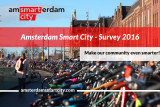
How do you use the online community of Amsterdam Smart City (this website)? What is your view on Amsterdam as smart city? And what are your expectations of this online community?
We are very curious about your answers. Please fill in this survey if you did not participate yet (5 minutes):
http://bit.ly/2fBZloc
Three copies of the book 'Smart City' from Anthony Townsend, a future classic, will be given away to the participants of this survey!
Bedrijven (bouw /installatietechniek /logistiek): meld je aan voor project De Hal en help mbo’ers aan het werk!
Jongeren voor wie onderwijsniveau 2 niet haalbaar is, kunnen vaak heel goed in de praktijk beroepsvaardigheden aanleren, maar worden hiervoor niet met een officieel diploma gewaardeerd. Certificeringstraject De Hal zoekt werkgevers die helpt deze studenten toch gerichte certificaten te laten behalen.
https://www.amsterdameconomicboard.com/projecten/opleidingswerkplaats-de-hal
Corporates met een tekort aan goed opgeleid IT talent? Doe mee met B. Startup School Amsterdam
Heb je een tekort aan IT-talent? B.StartupSchoolAmsterdam (BSSA) leidt HBO'ers en WO'ers op tot onder andere IT'ers. Doe mee met deze nieuwe manier van werven, opleiden en begeleiden van jong IT-talent.
https://www.amsterdameconomicboard.com/projecten/brug-onderwijs-arbeidsmarktstartersbeurs
Help mee aan een betere aansluiting in de dynamische technieksector met Vakschool Technische Installaties. Word partner!
De roep vanuit bedrijven in de metropoolregio Amsterdam om meer én beter geschoold installatietechnisch personeel is groot. Want het huidige opleidingsniveau sluit onvoldoende aan op de eisen en wensen van bedrijven. Vakschool Technische Installaties (VTi) biedt een onconventionele oplossing voor een betere aansluiting tussen onderwijs en arbeidsmarkt.
https://www.amsterdameconomicboard.com/projecten/opleidingshuis-installatietechniek
Zoek je werknemers met een topsport mentaliteit? Word partner van Studeren met Topmentaliteit
Studeren met Topmentaliteit richt zich op het bijbrengen van houding en gedrag bij mbo studenten. Er wordt getraind op zeven vaardigheden, die binnen het onderwijs bekend staan als de 21st Century Skills. Deze overlappen met verschillende competenties die bij topsport nodig zijn, zoals samenwerking en probleemoplossend vermogen.
Sponsoren voor Studeren met Topmentaliteit mogen zich melden bij Maurijn Odé.
https://www.amsterdameconomicboard.com/projecten/topsportvaardigheden-vertaald-naar-werkvloer
Stay up to date
Get notified about new updates, opportunities or events that match your interests.

